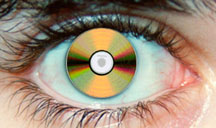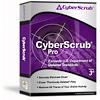|
Beware - the mp3 big brother is watching you! Everywhere you turn in the media these days you are being bombarded by stories about the so-called 'evils' of downloading mp3's. Newspapers, TIME magazine, Rolling Stone & even the cover of a recent BLENDER cover stated "1001 Greatest Songs To Download Right Now!". And just how are these corporate demi-gods planning on fighting this 'cause of all ills' of the music industry? Well, it seems that their solution is to sue 12 year-olds and elderly grandparents in a bumbling combination of Keystone Cop meets nazi storm trooper mentality. However, the RIAA has added an amnesty program to their intimidation tactics - promising not to sue IF you promise to delete the songs off your computers. The first wave of lawsuits launched by The Recording Industry Association of America against music fans includes such hard-core criminals as: 1. Twelve-year-old Brianna Lahara, a seventh-grade honor student. 2. A 71-year-old man from Texas whose teenage grandchildren downloaded music onto his computer during their visits to his home. 3. A Yale University professor who downloaded about 500 songs from others on the Internet. But this all gives me a sense of deja vu. Remember the 'home-taping' scare of the early '80s? That was the battle-cry of the recording industry caught in a slump with a desperate The Dead Kennedys hit the nail on the head when they sang: "But sales are slumping And no one will say why…Could it be they put out one too many lousy records?" Out of all of my musical-minded friends at that time, I only knew of ONE person that regularly home-taped borrowed albums. Then in the '80s technology changed with the advent of the compact disc. The CD was the chance for the record labels to recoup any so-called 'lost' profits. Suddenly, the record industry had a product that cost half of what a cassette cost to manufacture - yet they could charge double the price. Talk about profit margin! While the recording industry blames downloading only, they did contribute to the problem by making the decision to stop selling CD singles (sales of CD singles peaked in 1997). This forced consumers to buy entire albums. Additionally, the record companies couldn't organize their own online music services. Into this gap came companies that recognized and exploited the demand: Napster, then Kazaa, Grokster, Morpheus and others. The record industry had a short-term victory when it killed Napster in 2001. At that time, Napster had about 20 million users. Now there are more than 10 times the number of users, thanks to the multitude of decentralized programs that replaced Napster. In a 2001 poll by the Pew Internet and American Life Project, 53 percent of American teenagers said they downloaded music regularly. Today's teenagers of 'Generation D' (Download) have pretty strong opinions about the mp3/CDR revolution. EAR CANDY writer Kim Filipek explains, "Over half my CD collection is burned. I'm only seventeen- I can't afford to buy all the music that I want. Just because I'm broke doesn't mean I shouldn't be able to enjoy what I want to listen to." Jackie Clark compares downloading to shoplifting stating, "You can never stop people from shoplifting, so it's pretty impossible to stop them from doing it in their own home." Others, such as Conor Quinn, see a wider picture of the money divided in the music industry. "I think its okay to download music, most bands make at least 30% of their money through merchandise and playing shows, plus people who are intense fans of an act will buy the CD for its artwork and/or bonus features." Finally, there are those music fans, who just want to be wise in how they spend their hard earned cash. "I sometimes download songs to see if I like the artist before actually buying the CD, so I don't waste my money on something I've never heard and might not like", explains Kathleen D'Angelo. If you still want to download, there is a new option called darknet. Darknets are private file-sharing networks with restricted membership. You have to be invited into the group and to gain access, there is a password. Some darknets encrypt the files and mask member identities to thwart eavesdropping. You can even start darknets on your own, and there are two programs available: Direct Connect (at neo-modus.com) and DC++ (sourceforge.net). And while popular downloading networks like Kazaa might go the way of Napster, there is a chance that darknets might take their place. Overall, CD sales have dropped about 26 percent since 1999, while sales of blank CDs have soared-1.7 billion last year. This number far surpasses the sales of recorded CDs. The genie is pretty much out of the bottle now, and the record companies will just have to adapt…or face even more losses.
Still think the mp3 big brother might be watching you? Then you might want to consider using computer security tools such as cyberscrub. Cyberscrub erases all evidence of downloads on your computer's hardrive. It ensures the complete and non retrievable erasure of selected data (files/folders), removes all evidence of web surfing activity, destroys email and wipes "locked" files such as paging/swp/index.dat. What CyberScrub will do is overwrite the files that pertain to the evidence of downloaded music on the local environment. However, the issue that the downloader still has is that the identity of the downloader is available to RIAA via the internet service provider. In other words, RIAA doesn't actually have to do a forensic search of the downloader's harddrive. But CyberScrub will remove the footprints of the files from the computer's hardrive. For a fully functional 15 day free trial visit www.cyberscrub.com/download
Sources: Los Angeles Times, the Atlanta Journal-Constitution, Time magazine, Blender Magazine
|
 "But sales are slumping
"But sales are slumping
